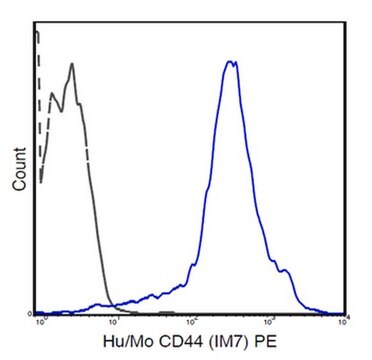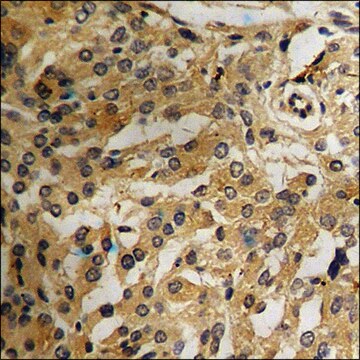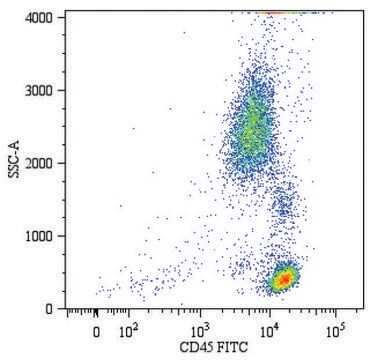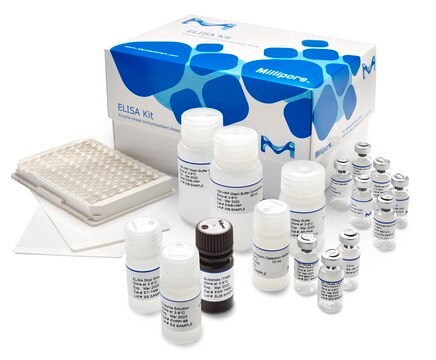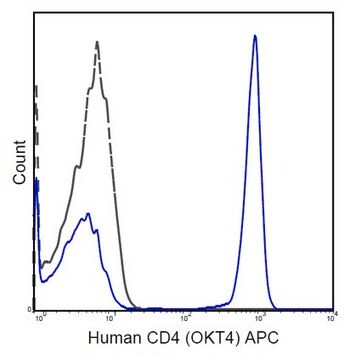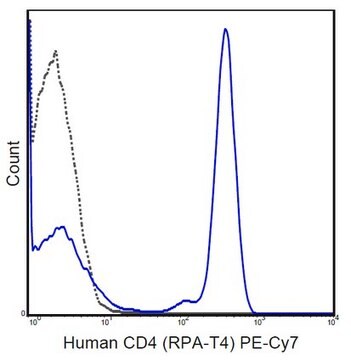Descrizione generale
Juvenile diabetes or insulin-dependent diabetes mellitus (IDDM) is considered as an autoimmune disease where islet infiltration of T cells, B cells, macrophages, and dendritic cells leads to their progressive destruction. It is reported that non-obese diabetic mice (NOD) express a single MHC class II molecule, IAg7, which is shown to be essential for the development of IDDM. It is shown that the major T cell insulin epitope resides with in amino acids 9-23 of the beta chain (B:9-23) and this peptide can bind to IAg7 in multiple positions (registers). Pathogenic CD4 T cells can recognize beta 9-23:I Ag7 complex when the insulin peptide is bound in register 3 (R3), which places amino acids 14-22 of the beta chain in the core P1 to P9 position and places arginine at P9 position, which is highly unfavored for the IAg7 pocket. The binding motifs of IAg7 are degenerate and contain small hydrophobic residues at P4 and P6 position. This monoclonal antibody (clone mAb287) selectively binds to B:9-23 when presented by IAg7 only in R3. It blocks the binding of IAg7-B:10-23 R3 tetramers to cognate T cells and impedes T cell responses to soluble B:9-23 peptides, but does not affect recognition of any other peptide bound to IAg7. This antibody is also shown to diminish T cell infiltration in NOD mice, delay the development of IDDM and overt hyperglycemia. (Ref.: Stratmann, T., et al. (2000). J Immunol. 165(6); 3214-3225; Zhang, L., et al. (2014). Proc. Natl. Acad. Sci. USA. 111 (7); 2656-2661).
Specificità
Clone mAb287 is a mouse monoclonal antibody that recognizes a molecular complex of mouse MHC class II (named I-Ag7) and a peptide derived from insulin B-chain, amino acids 9-22.
Immunogeno
Soluble I-Ag7 bearing Insulin R3 peptides.
Applicazioni
Anti-insulin peptide MHC, clone mAb287, Cat. No. MABF2117, is a mouse monoclonal antibody that detects Insulin peptide -MHC and has been tested for use in ELISA, Flow Cytometry, and Inhibition assay.
Flow Cytometry Analysis: A representative lot detected insulin peptide MHC in Flow Cytometry applications (Zhang, L., et. al. (2014). Proc Natl Acad Sci USA. 111(7):2656-61).
ELISA Analysis: A representative lot detected insulin peptide MHC in ELISA applications (Zhang, L., et. al. (2014). Proc Natl Acad Sci USA. 111(7):2656-61).
Inhibition Analysis: A representative lot of this antibody inhibited in vitro responses of insulin-specific T-cell hybridomas/transfectomas. (Zhang, L., et. al. (2014). Proc Natl Acad Sci USA. 111(7):2656-61).
Research Category
Signaling
Qualità
Evaluated by Isotype testing,
Stato fisico
Format: Purified
Protein G purified
Purified mouse monoclonal antibody IgG1 in PBS without preservatives.
Stoccaggio e stabilità
Stable for 1 year at -20°C from date of receipt. Handling Recommendations: Upon receipt and prior to removing the cap, centrifuge the vial and gently mix the solution. Aliquot into microcentrifuge tubes and store at -20°C. Avoid repeated freeze/thaw cycles, which may damage IgG and affect product performance.
Altre note
Concentration: Please refer to lot specific datasheet.
Esclusione di responsabilità
Unless otherwise stated in our catalog or other company documentation accompanying the product(s), our products are intended for research use only and are not to be used for any other purpose, which includes but is not limited to, unauthorized commercial uses, in vitro diagnostic uses, ex vivo or in vivo therapeutic uses or any type of consumption or application to humans or animals.
